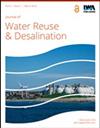Social knowledge, attitudes, and perceptions on wastewater treatment, technologies, and reuse in Tanzania
IF 2.3
Q2 Environmental Science
引用次数: 3
Abstract
This study assessed the social knowledge, attitude, and perceptions (KAPs) on wastewater treatment, the technologies involved, and its reuse across different wastewater treatment areas in four regions of Tanzania. We used both quantitative and qualitative data collection methods in a household-level questionnaire (n=327) with structured and semi-structured questions, which involved face-to-face interviews and observation. Our results show that social KAPs surrounding wastewater treatment and reuse were sufficient based on KAP scores achieved from asked questions. However, the general knowledge on treatment technologies, processes, and reuse risks was still low. Of the respondents, over 50% approved using treated wastewater in various applications, while the majority (93%) were reluctant if the application involved direct contact with the water. Furthermore, over 90% of interviewees did not know the technologies used to treat wastewater and the potential health risks associated with its use (59%). Multivariate analysis of variance revealed significant differences (P<0.05) in the KAPs on treated wastewater across different studied demographic variables, i.e., age, sex, and education level. Therefore, we recommend that more effort be spent on providing public education about the potential of wastewater treatment and existing technologies in order to facilitate their adoption for the community's and environment's benefit.坦桑尼亚关于废水处理、技术和再利用的社会知识、态度和看法
本研究评估了坦桑尼亚四个地区不同废水处理区对废水处理、相关技术及其再利用的社会知识、态度和看法(KAP)。我们在一份家庭层面的问卷(n=327)中使用了定量和定性数据收集方法,其中包括结构化和半结构化问题,包括面对面访谈和观察。我们的研究结果表明,基于提问的KAP得分,围绕废水处理和再利用的社会KAP是足够的。然而,关于处理技术、工艺和再利用风险的一般知识仍然很低。在受访者中,超过50%的人赞成在各种应用中使用处理过的废水,而如果应用涉及直接接触水,大多数人(93%)则不愿意。此外,超过90%的受访者不知道用于处理废水的技术以及与使用废水相关的潜在健康风险(59%)。多元方差分析显示,在不同的研究人口统计学变量(即年龄、性别和教育水平)中,处理过的废水的KAP存在显著差异(P<0.05)。因此,我们建议加大力度,向公众提供有关废水处理潜力和现有技术的教育,以促进采用这些技术,造福社区和环境。
本文章由计算机程序翻译,如有差异,请以英文原文为准。
求助全文
约1分钟内获得全文
求助全文
来源期刊

Journal of Water Reuse and Desalination
ENGINEERING, ENVIRONMENTAL-WATER RESOURCES
CiteScore
4.30
自引率
0.00%
发文量
23
审稿时长
16 weeks
期刊介绍:
Journal of Water Reuse and Desalination publishes refereed review articles, theoretical and experimental research papers, new findings and issues of unplanned and planned reuse. The journal welcomes contributions from developing and developed countries.
 求助内容:
求助内容: 应助结果提醒方式:
应助结果提醒方式:


